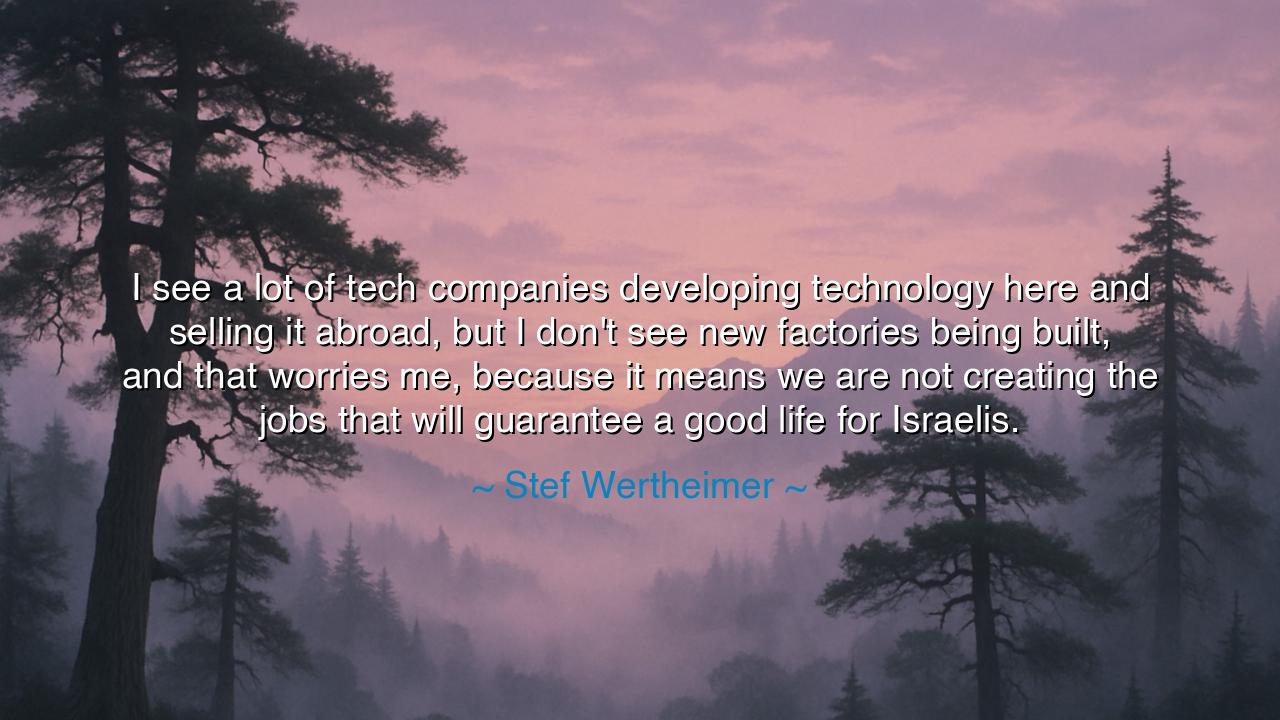
I see a lot of tech companies developing technology here and
I see a lot of tech companies developing technology here and selling it abroad, but I don't see new factories being built, and that worries me, because it means we are not creating the jobs that will guarantee a good life for Israelis.






In the words of Stef Wertheimer, the craftsman, industrialist, and builder of nations, we find a cry that reaches beyond economics and into the very heart of society: “I see a lot of tech companies developing technology here and selling it abroad, but I don’t see new factories being built, and that worries me, because it means we are not creating the jobs that will guarantee a good life for Israelis.” These words carry the weight of one who has seen nations rise and fall, and who knows that prosperity without roots in labor and craft is as fragile as a house built upon sand.
For technology, wondrous though it may be, is not in itself enough to sustain the people. To invent is noble, but invention without production is a tree without fruit. Wertheimer speaks not against progress, but against the imbalance of progress that leaves behind the worker, the craftsman, and the builder. When the brilliance of engineers serves only distant markets, but fails to provide factories at home, then wealth flows outward like water from a cracked jar, leaving the land thirsty.
Consider the tale of the Industrial Revolution in England. In those days, new machines transformed not only ideas but entire cities. Looms and forges were built, railways carved across the countryside, and though the upheaval was great and often harsh, it created the jobs that gave bread to millions. Nations that embraced both invention and production grew strong; those that embraced only one faltered. So too Wertheimer warns: to innovate without building at home is to risk hollowing out the strength of a nation’s people.
His words arise from his own life’s path. Wertheimer himself was known not only as a man of vision, but as a builder of industrial parks across Israel. He believed that factories were not mere sites of labor, but schools of dignity, where hands and minds together created both goods and a livelihood. Through industry, he saw not just profit, but the weaving of social fabric—jobs that anchored families, gave youth hope, and built the foundation of what he called a “good life.”
Yet his concern is not limited to Israel. It is the concern of all nations in the modern age, where tech companies soar in valuation while workers are left behind. The glowing screens of innovation mask the quiet despair of those without purpose or employment. Wertheimer reminds us of a simple truth: technology that does not serve the people directly, by creating opportunity and sustaining communities, risks becoming a tool that enriches a few while impoverishing the many.
The meaning of the quote, then, is both warning and instruction. It is a warning that a society which builds its prosperity only on the export of ideas, without the grounding of jobs and production, is like a tree without roots—it may flourish for a season, but it will not endure. It is also an instruction: that true development must bind together invention and employment, technology and factories, vision and labor, so that the fruits of progress are shared by all.
The lesson for us is clear: wherever we labor, we must ask not only, What brilliance can we create? but also, Whose lives does this brilliance sustain? If you are an innovator, think not only of distant markets, but of the community around you. If you are a leader, remember that jobs are not mere numbers, but the lifeblood of dignity. And if you are a citizen, honor and support the builders, the workers, the makers, for they are the foundation upon which nations stand.
So let Wertheimer’s words guide you: embrace technology, yes, but never forsake the factories and the jobs that give it meaning. For only when invention walks hand in hand with labor does society thrive, and only then can a people say they have built not just wealth, but a life worth living.






AAdministratorAdministrator
Welcome, honored guests. Please leave a comment, we will respond soon